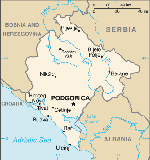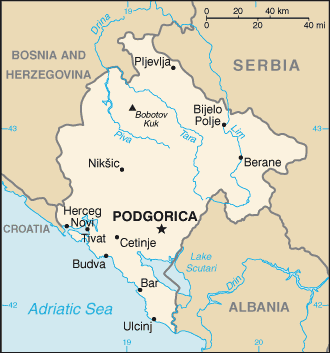 Montenegro
Montenegro
Country Specific Information
On this page » |
|
March 05, 2008
COUNTRY DESCRIPTION:
 Montenegro declared its independence from the State Union of Serbia and Montenegro on June 3, 2006, following a peaceful
referendum process. Montenegro is a small Balkan country currently undergoing significant political and economic change. Tourist
facilities are widely available but vary in quality and some may not be up to Western standards. Read the Department of State
Background Notes on Montenegro for additional information.
Montenegro declared its independence from the State Union of Serbia and Montenegro on June 3, 2006, following a peaceful
referendum process. Montenegro is a small Balkan country currently undergoing significant political and economic change. Tourist
facilities are widely available but vary in quality and some may not be up to Western standards. Read the Department of State
Background Notes on Montenegro for additional information.
Travelers are required to declare currency in excess of 2,000 Euros upon entry and must obtain from customs officials a declaration form that must be presented at departure. Failure to comply may result in confiscation of funds and criminal proceedings.
Registration with Local Authorities: Visitors staying in private accommodations other than hotels must register with the
police station responsible for the area in which they are staying within 24 hours of arrival. Failure to comply may result
in a fine, incarceration, and/or expulsion. Persons who fail to register may face difficulties in departing the country. Visitors
staying in hotels or tourist facilities are automatically registered with the police by the hotel.
Information about dual nationality or the prevention of international child abduction can be found on our web site. For further information about customs regulations, please read our Customs Information sheet.
Montenegrin nightclubs and tourist centers are popular with foreign tourists. Patrons should be aware that these establishments
can be crowded and may not comply with western standards for occupancy control and fire safety.
On January 23, 2006, a passenger train derailment in Montenegro resulted in 48 deaths and numerous casualties. Travelers in
the region may wish to consider the safety of train travel in light of this accident.
For the latest security information, Americans traveling abroad should regularly monitor the Department of State, Bureau of Consular Affairs’ web site at http://travel.state.gov, where the current Travel Warnings and Travel Alerts, as well as the Worldwide Caution, can be found.
Up-to-date information on safety and security can also be obtained by calling 1-888-407-4747 toll free in the U.S., or for callers outside the U.S. and Canada, a regular toll-line at 1-202-501-4444. These numbers are available from 8:00 a.m. to 8:00 p.m. Eastern Time, Monday through Friday (except U.S. federal holidays).
The Department of State urges American citizens to take responsibility for their own personal security while traveling overseas. For general information about appropriate measures travelers can take to protect themselves in an overseas environment, see the Department of State’s pamphlet A Safe Trip Abroad.
CRIME: Street crime in Podgorica is at a level to be expected for a small European city of 170,000 people. Residential break-ins present the greatest security concern for expatriates in Montenegro; however, the number is still relatively small. Violent crime is limited and usually occurs among rival criminal gangs, rarely affecting foreigners. Police have a limited ability to provide services in English. In case of emergency, the police telephone number is 92, or toll-free 112 if called from a mobile phone of any mobile provider. INFORMATION FOR VICTIMS OF CRIME: The loss or theft abroad of a U.S. passport should be reported immediately to the local police and the nearest U.S. Embassy or Consulate. If you are the victim of a crime while overseas, in addition to reporting to local police, please contact the nearest U.S. Embassy or Consulate for assistance. The Embassy/Consulate staff can, for example, assist you to find appropriate medical care, contact family members or friends, and explain how funds could be transferred. Although the investigation and prosecution of the crime is solely the responsibility of local authorities, consular officers can help you to understand the local criminal justice process and to find an attorney if needed.For additional assistance see our information for Victims of Crime.
MEDICAL FACILITIES AND HEALTH INFORMATION: Although many physicians in Montenegro are highly trained, hospitals and clinics are generally not equipped or maintained to Western standards. Medicines and basic medical supplies are largely obtainable in privately owned pharmacies. Hospitals and private clinics usually require payment in cash for all services. Montenegro has a small number of ambulances and consequently, emergency services are generally responsive in only the most severe cases. Otherwise, people are expected to provide their own transportation to hospitals and clinics. For information on avian influenza (bird flu), please refer to the Department of State's Avian Influenza Fact Sheet, available at http://travel.state.gov/travel/tips/health/health_1181.html.Information on vaccinations and other health precautions, such as safe food and water precautions and insect bite protection, may be obtained from the Centers for Disease Control and Prevention’s hotline for international travelers at 1-877-FYI-TRIP (1-877-394-8747) or via the CDC’s web site at http://wwwn.cdc.gov/travel/default.aspx. For information about outbreaks of infectious diseases abroad consult the World Health Organization’s (WHO) web site at http://www.who.int/en. Further health information for travelers is available at http://www.who.int/ith/en/.
MEDICAL INSURANCE: The Department of State strongly urges Americans to consult with their medical insurance company prior to traveling abroad to confirm whether their policy applies overseas and whether it will cover emergency expenses such as a medical evacuation. Please see our information on medical insurance overseas. TRAFFIC SAFETY AND ROAD CONDITIONS: While in a foreign country, U.S. citizens may encounter road conditions that differ significantly from those in the United States. The information below concerning Montenegro is provided for general reference only, and may not be totally accurate in a particular location or circumstance.Roads in Montenegro are often poorly maintained, especially in rural areas. Dangerous areas for road travel include a road called "Moraca Canyon," north of Podgorica. This is a twisting, two-lane road that is especially overcrowded in the summer. In the winter, the "Moraca Canyon" and northern parts of Montenegro are covered with snow, which may slow down traffic. Roads that lead to the Montenegro coastal areas are in better condition, but are overcrowded during summer season. Drivers should exercise extreme caution, as it is common for Montenegrin drivers to attempt to pass on winding roads and hills. Montenegrin drivers are often reckless and aggressive, and accidents are frequent.
The use of seat belts is mandatory and cell phone usage while driving is prohibited. Traffic law requires that vehicle lights
must be switched on at all times while driving. A driver with a blood alcohol level higher than 0.5 g/kg (US equivalent of
0.05) is considered intoxicated. Roadside assistance is available by dialing 9807, +382-81-234-467, or +382-81-234-999. Other
emergency numbers are police: 92, fire department: 93, and ambulance: 94.
Metered taxi service is safe and reasonably priced, although foreigners are sometimes charged higher rates. It is advisable
to negotiate a price in advance of travel by taxi between cities.
Please refer to our Road Safety page. Visit the website of Montenegro’s national tourist office and national authority responsible for road safety at www.visit-montenegro.org.
AVIATION SAFETY OVERSIGHT: Since Montenegro’s independence, the U.S. Federal Aviation Administration (FAA) has not separately assessed the Government of Montenegro’s Civil Aviation Authority for compliance with International Civil Aviation Organization (ICAO) aviation safety standards. However, the FAA earlier assessed the Government of Serbia and Montenegro’s Civil Aviation Authority as not being in compliance with ICAO standards for oversight of Serbia and Montenegro’s air carrier operations. For more information, travelers may visit the FAA’s web site at http://www.faa.gov/safety/programs_initiatives/oversight/iasa. SPECIAL CIRCUMSTANCES: Dual U.S./Montenegrin nationals may be subject to laws that impose special obligations on Montenegrin citizens. According to Montenegro's Constitution adopted on October 19, 2007, all citizens may retain dual citizenship for one year while the Montenegrin government signs bilateral memorandums with individual countries. A new citizenship law is expected to be adopted in a few months. As of August 30, 2006, Montenegrin men are no longer required by Montenegrin law to perform military service. See Citizenship and Nationality section for additional information regarding dual nationality.There are occasional water and electricity outages during peak summer season due to high demand.
Please also see our Customs Information.
* * *
This replaces the Country Specific Information for Montenegro dated August 14, 2007, to update sections on Entry/Exit Requirements,
Safety and Security, Medical Facilities and Health Information, Traffic Safety and Road Conditions, Special Circumstances
and Criminal Penalties.

